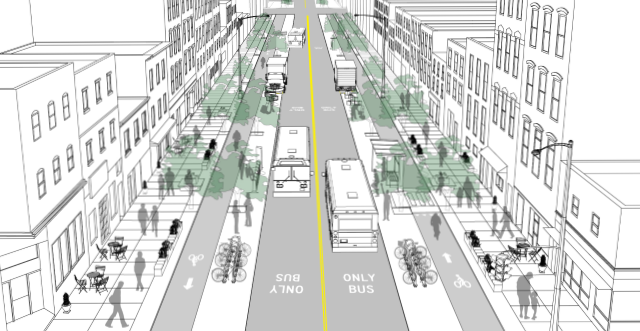Brooklyn City Council Member Antonio Reynoso is ready to fight for a Grand Street dedicated to transit, biking, and walking.
Reynoso spoke in Greenpoint last night at a candidate forum about the looming L train shutdown hosted by Transportation Alternative ahead of next Tuesday's Democratic primary. (Tommy Torres, Reynoso's primary challenger, was not in attendance.)
TransAlt is calling for a car-free "PeopleWay" on Grand Street with bus lanes and protected bike lanes to keep people moving during the shutdown. Reynoso wants to see it happen. "Grand Street PeopleWay is something that can be real and I think can be permanent, if we do it the right way," he said. "This idea that the cars need to be there for business to excel is not necessarily a true statement."
Reynoso, whose district encompasses the entirety of Grand Street, said that during the shutdown private vehicles should not be allowed, in order to make room for surface transit, protected bike lanes, and expanded pedestrian space. Special allowances could still be made for commercial deliveries, he said, and the improvements should be permanent.

"I just want to make sure that whatever we do, we fight after we’re done here to maintain most of that infrastructure, that we don’t let that go away."
Also on the panel were Council Member Stephen Levin and Victoria Cambranes, who's running as an independent against him in the November general election, as well as representatives from five local business and community groups.
Businesses on Grand Street are more "cautious," said Homer Hill, executive director of the Grand Street Business Improvement District. Leah Archibald of Evergreen Exchange, a North Brooklyn industrial business group, was worried about where truck traffic would go without access to Grand Street.
Hill said he'd had bad experiences with projects implemented by the Department of Design and Construction, which often takes ages to complete work on street infrastructure, which led him to question how a Grand Street overhaul would play out. "There are a lot of things about the PeopleWay that could bring a lot of positive changes, but even the perfect plan is not implemented by the perfect agency," Hill said. "The devil is in the details on this."
For Williamsburg and Greenpoint businesses, maintaining high-capacity transit along Grand Street and the L train corridor will be critical to retaining their customer base.
Felice Kirby of Brooklyn Allied Bars and Restaurants didn't announce a position on the PeopleWay, but she pointed out that MTA's strategy of moving as many riders as possible to other subway lines threatens business. "Eighty to eighty-five percent of the existing ridership will be gone by the time they hit the Williamsburg area," she said. "You've got businesses... that have a lease that's going to go on for years in the future -- based on an economic fact of so much foot traffic coming in, and so much of that foot traffic is from the L train."
Levin, whose district includes the Bedford Avenue L stop but not Grand Street, pointed out that Fulton Street in downtown Brooklyn has thrived as a bus-only right-of-way.
"I think it's probably a good idea to have a dedicated bus lane on the Williamsburg Bridge, I think that's probably going to have to happen," Levin said, in addition to "some solution on the [Manhattan] side of the bridge."
Residents and business owners are currently waiting on the MTA and DOT to release their initial L train plan in November.






